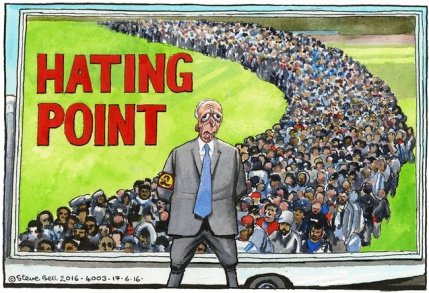
The UKIP campaign as seen by Steve Bell
One of the vice provosts dropped by my office today. It didn’t take long before he spun round to the topic of Brexit.
“So what’s going on in your country with this EU thing?” he asked.
“Pretty much the British version of Trump.” I replied.
And not for the first time this week, I found myself struggling to explain the inexplicable.
My sense is that people in the US have only caught on about how serious this is very recently: maybe only since the awful murder of the politician Jo Cox last week. But then to be completely honest, it was probably only a month ago that I realized myself there was going to be a referendum. And even then it took me a day or two to finally admit it was real. It was actually going to happen.
Because the whole idea makes absolutely no sense to me!
I knew that the anti-foreigner sentiment in the UK was getting worse, because the xenophobic changes to the spousal visa are one half of the reason I haven’t been able to return home myself. (The other half is that UK academia is on its knees, due in no small part to the imposed insularity of all the other visa restrictions. Topics for a different post perhaps.)
But I still didn’t see it coming and now I don’t understand it.
There is so much to lose by the UK leaving the European Union : I can’t for the life of me figure out what could possibly be gained. How can the vote be so close? Is it just driven by naked nationalistic hatred?
In contrast, I felt like I understood the impetus behind the Scottish referendum.
For selfish reasons I desperately wanted Scotland to remain part of the UK: Scottish politics/politicians seem on the whole to be more socialist and humane, Gordon Brown notwithstanding. Westminster needs more, not fewer, Scots running things!
But the debates that I heard, particularly through the BBC’s excellent coverage in the months leading up to the vote, provided some of the most in-depth and nuanced discussions I’ve yet come across, of what democracy and sovereignty mean in both theory and practice.
Brexit, however, is nothing but rapid race-baiting on one side and panic on the other. Nothing, nothing good will come of it either way.
But if the UK does leave the EU tomorrow, I have a horrible feeling that the country will slump into such a deep economic and cultural recession, it will take at least a generation to recover.The prospect is frightening. But more so because (living at a distance) it came on me out of the blue.
One thing is clear: this hateful swing to the right has been building for sometime and isn’t unique to the UK.
To a large extent I’m convinced that the UKIPers are just the British version of Trump, as Gary Younge has argued over in the Guardian. I don’t think most British people realize this, or like to admit it. Trump looks from the UK like a red herring, because he is so extremely and, yes, comically American.
When J and I visited my relatives in the UK back in March, we instituted a ban on talking about Trump. Partly because we were so emotionally exhausted thinking about it. (I felt a little guilty about it, as if it were an abdication of responsibility, but I needed a couple of weeks to not think about racism and violence. To not even read the news. To just cuddle my baby nieces and nephews and drink far too much tea.)
But also because I knew that my British relatives would want to talk to us about Trump as if he were this hilarious oddity. To joke about him in that “Look how stupid Americans are! How can you possible bear to live there way!” way enjoyed by the Brits who love me.
Not taking Trump seriously is the reason Trump has got as far as he is. He is not a joke: as an Italian who lived through Berlusconi will tell you. He is the obvious conclusion to everything that the Republican party has been building up to in the last few decades, the kind of mockery of the most basic concept of governance that leads to the absurdity of elected politicians staging a sit-in. The sign of a country whose democracy is broken.
As much as I hate to admit it, there are strong reasons why the disenfranchised are turning to Trump, even people of color. It horrifies me, but there is some understanding there.
Now I wonder if I was ignoring the signs myself. Or willfully downplaying them in my own “It can never happen in the UK” kind of way.
Jo Cox’s murder was a wake up call that this shit is serious, and it isn’t just a US problem. Tomorrow we may reap the consequences of the British arrogance that somehow we are better than the US.

Pingback: What the F just happened? For my US friends, a long attempt to Brexplain | Dispatches From The Wrong Side